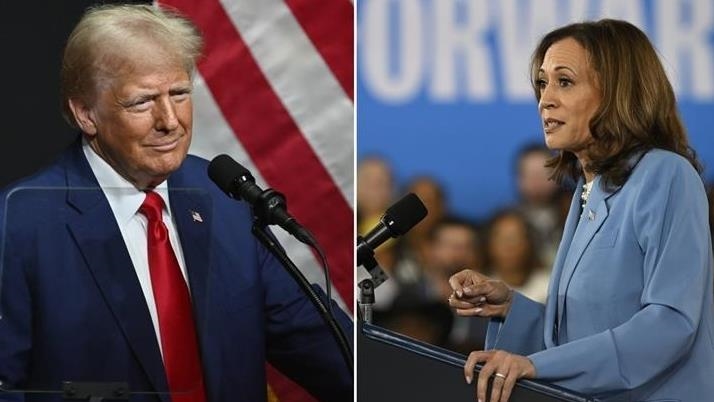7 swing states set to determine outcome in tight race
WASHINGTON
As the American public prepares to vote in the 60th presidential election on November 5, the fierce competition between Democrat Kamala Harris and Republican Donald Trump has focused attention on seven critical swing states.
7 key states that will largely determine the winner of the 2024 US election ⤵️
📍 Arizona
📍 Nevada
📍 Michigan
📍 Pennsylvania
📍 North Carolina
📍 Georgia pic.twitter.com/T1rUSEkgfI— Anadolu English (@anadoluagency) August 28, 2024
These states, known for their unpredictable voting patterns, will play a decisive role in determining the next president of the US.
The states under the spotlight include Arizona, Nevada, Wisconsin, Michigan, Pennsylvania, North Carolina, and Georgia have historically swung between Democratic and Republican candidates in past elections, making their outcomes crucial in the upcoming vote.
The importance of these states lies in the unique US electoral system, the Electoral College. Under this system, the president is not chosen directly by popular vote but by 538 electors. A candidate needs a majority of 270 electors to win the presidency.
Therefore, the candidate who receives the most votes in a state typically takes all of that state’s electoral votes, making victories in populous and competitive states essential.
Despite the consistent partisan leanings of major states like California and Texas, which have long supported Democrats and Republicans respectively, the battleground states’ outcomes remain unpredictable and pivotal.
With updated electoral votes from the 2020 census, these key states will once again be at the center of the election, holding a combined total of 93 electoral votes.
In the previous 2016 election, Trump won despite receiving fewer total votes than his opponent, thanks to his success in these critical states, securing 304 electoral votes and the presidency.
Currently, polling data shows that the race between Harris and Trump in these key states is incredibly close.
According to Real Clear Politics (RCP), Trump leads Harris by less than 1% in five of the seven swing states. Nationally, Harris holds a slight edge over Trump, but in these battleground states, the margin is razor-thin, indicating a close race.

As the election day approaches, the race between Harris and Trump heats up, with both candidates running neck-and-neck in key states. The outcome in these states will most likely determine the next president, setting the stage for a highly contentious and closely watched election.
Delegate in key States
According to the updated delegate counts based on the 2020 census, Arizona has 11 delegates, Nevada has six, Wisconsin has 10, Michigan has 15, Pennsylvania has 19, North Carolina has 16, and Georgia has 16 delegates.
For example, if a candidate wins Pennsylvania, North Carolina, and Michigan, they would secure a total of 50 delegates from just these three states. Conversely, losing four of these states would significantly reduce a candidate’s chances of winning the election.
In the 2016 presidential election, Trump won despite receiving fewer total votes than his opponent, Hillary Clinton, by securing 304 delegates through strong performances in key states.
Key States in the Harris-Trump Race
On July 21, when US President Joe Biden announced his withdrawal from the race and endorsed Harris as the Democratic candidate, Trump was leading Biden in both national polls and key state polls.
At that time, Biden had 42.3% support in key state polls, compared to 46.7% for Trump.
With Biden’s withdrawal, Harris quickly closed the gap with Trump after her nomination. As of today, in key state polls, both candidates are nearly tied, with Harris at 47.3%.
According to data from Real Clear Politics (RCP), a platform that publishes US election polls, Trump leads Harris by less than 1% in five of the seven key states.
The average of 14 national polls conducted between August 22-27 shows Harris with 48.4% and Trump with 46.9% support.
Looking at each key state individually, Trump leads in Arizona with 47.3% to Harris’s 46.8%; in Nevada, Trump has 47.4% to Harris’s 46%; in Wisconsin, Trump has 47.6% to Harris’s 48.6%; in Michigan, Trump has 46.5% to Harris’s 48.5%; in Pennsylvania, Trump has 47.7% to Harris’s 47.5%; in North Carolina, Trump has 47.2% to Harris’s 46.3%; and in Georgia, Trump has 48.1% to Harris’s 47.1%.
The average of recent polls in these seven swing states shows Trump with 47.4% and Harris with 47.3% support.
The fact that Trump, who led Biden in all of these states, is now in a near-tie with Harris indicates that the presidential race will be highly competitive between Democratic and Republican voters.
State dynamics: Economy, abortion debates, border security, Gaza
Nationwide polls indicate that inflation and economic issues, debates over abortion, and border security are the main concerns on voters’ minds. Additionally, the US policy on Gaza is emerging as a significant issue.
Michigan, a key state with 15 delegates and the largest population of Muslim and Arab Americans in the country has seen a surge of “independent” voters, driven by harsh criticism of Biden’s Gaza policy. These voters, who criticize Biden’s unconditional support for Israel, are signaling that they may not vote for him but also do not see Trump as a viable alternative.
These independents are considering finding a third-party candidate or voting for Harris if US policy toward Israel changes. They are paying close attention to Harris’ stance on Gaza.
Meanwhile, in Wisconsin, a critical state that has narrowly favored Democrats in every election since 2000, except for 2016, Trump pulled off an unexpected victory eight years ago. In this state, where blue-collar workers are prevalent, the economy remains the most significant issue.
All indicators in Wisconsin, which the Democrats reclaimed through Biden in 2020, suggest that the margin between Trump and Harris is less than 1% in favor of the Democrats.
In Pennsylvania, another state where discussions around the economy and abortion are intense, the winner of the last two elections (Trump in 2016 and Biden in 2020) triumphed by a margin of less than 1%.
Experts who closely monitor the state’s election dynamics note that Pennsylvania is one of the few states where the number of Democratic and Republican voters is nearly equal, making demographic-based election predictions challenging.
Georgia, which sparked controversy in 2020 due to its influence on election results and subsequent legal battles, is also emerging as a key state for the 2024 elections.
In this state, where Republican leanings have reportedly increased recently, Trump won comfortably in 2016 but lost to Biden by just 0.3% in 2020, leading to significant disputes.
Anadolu Agency website contains only a portion of the news stories offered to subscribers in the AA News Broadcasting System (HAS), and in summarized form. Please contact us for subscription options.




